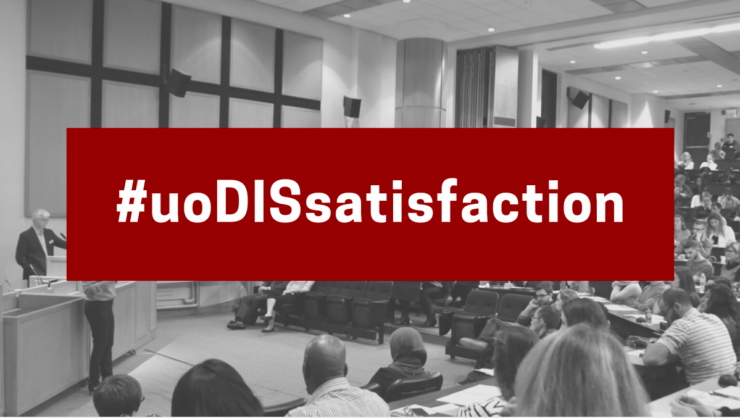Lack of investment in necessary resources could lead to a drop in education quality
The Inter-Union Coalition of the University of Ottawa (ICUO) has written a letter to U of O President Jacques Frémont expressing their concerns with the University of Ottawa’s transition to online learning for the fall 2020 semester.
Formed by the University of Ottawa Students’ Union (UOSU), Graduate Students Association (GSAÉD), the Association of Professors of the University of Ottawa (APUO), the Association of Part-Time Professors of the University of Ottawa (APTPUO), CUPE 2626, University of Ottawa IT Professionals and the Support Staff of the University of Ottawa (SSUO) the ICUO wrote the letter as part as their “uoDISssatisfaction” campaign to promote a “higher standard of learning” for faculty, staff, and students at the University of Ottawa.
The main concern outlined in the letter is the ongoing practice by the U of O of increasing the size of classes instead of creating different sections for popular classes due to them being held online and not confined by the physical limitations of a classroom.
This is directly attributable according to the ICUO to a lack of willingness to invest from the University in the proper resources to assure a smooth and successful transition to online learning. This lack of investment could according to the letter lead to a reduction in educational quality.
“Stacking students into virtual classrooms without any theoretical ceiling results in a lack of engagement where most students will abandon the course, even when the professor is the world’s foremost expert and an inspiring lecturer,” wrote Tom Boogaart a history professor at the U of O and the APTPUO’s Vice-President Internal, to the Fulcrum. “Online classrooms are impersonal and learning is fundamentally a social activity. Stacking students into massive enrollment classes might make great economic sense, but it leads to poor learning outcomes. Size isn’t everything, but it turns out that size does matter. Ask yourself for a minute what kind of interaction are you going to get when a professor teaches a 500-person class?”
The University, however, disagrees with Boogaart.
“[Provost] [Jill] Scott pointed out though that research shows that there is no significant correlation between class size and the quality of the student learning experience,” wrote Patrick Charette, the University of Ottawa’s Director of Institutional Communications in an email to the Fulcrum. “Course design and pedagogical approaches are the most prominent factors contributing to academic success. This is why significant additional resources have been added to the Teaching and Learning Support Service (TLSS) to help faculty members in their preparation to online courses.”
The ICUO “urges the Central Administration to reverse its decision to increase class sizes for the fall semester.” The ICUO believes that it is doing its part to uphold quality education in order to provide students with the “best possible education to retain students” and that “the Central Administration should do its part by avoiding cost-cutting measures, such as the merging of class sections and increasing class sizes.”
“The University agrees with the coalition that efforts and resources must be invested in protecting the integrity and the quality of education we offer to our student,” wrote Charette.
The U of O told the Fulcrum that “contrary to what the coalition states, no decision with respect to class sizes has been made.”
“The University appreciates the challenges related to distance learning and both her [Scott] office and all faculties will remain vigilant to ensure class sizes are managed in the most efficient way,” stated Charette. “The Registrar’s Office is currently compiling the most recent statistics about course enrollment and will make sure that should any issue be raised, regular protocols will be applied and appropriate strategies taken to address them and protect the integrity of our academic work. This could potentially include adding extra resources or opening additional course sections to accommodate students’ needs.”
The fact does remain, however, that professors and members of non-professorial unions part of the ICUO believe that there is a lack of resources at their disposal to properly adapt to an online learning environment and that this could affect student retention and their ability to learn and succeed in the fall.
Class sizes aren’t the only element concerning Boogaart and Tim Gulliver the UOSU’s Advocacy Commissioner. Both believe that professors lack the training resources to properly adapt to an online learning environment that could jeopardize the quality of students’ education. Part-time professors, in particular, are expected to learn to use new online platforms to teach in only a couple of weeks and to adapt their course load for sometimes multiple courses in that same short period of time.
The University, however, states that “significant additional resources have been added to the Teaching and Learning Support Service (TLSS) to help faculty members in their preparation for online courses.”







